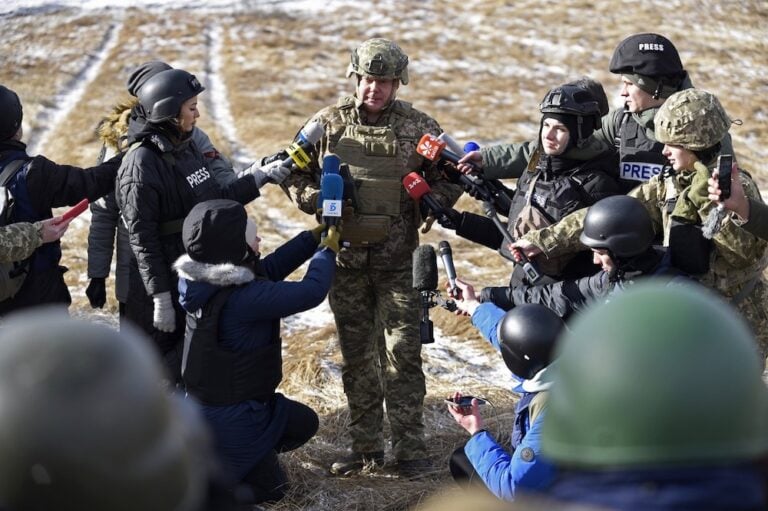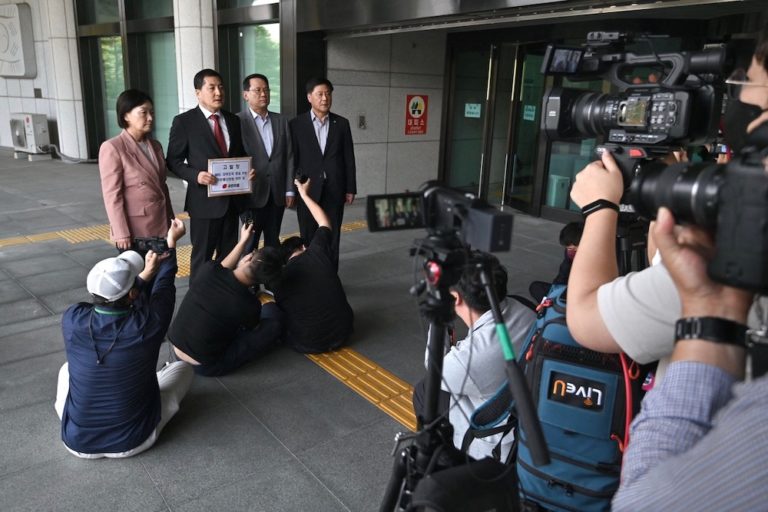(IPI/IFEX) – The following is an IPI letter to South Korean President Roh Moo-hyun: His Excellency Roh Moo-hyun President of the Republic of Korea Cheong Wa Dae (Blue House) Seoul, Republic of Korea Fax: +822 770 2209 / 770 2549 Vienna, 27 August 2007 Your Excellency, Since the International Press Institute’s (IPI) letter to Your […]
(IPI/IFEX) – The following is an IPI letter to South Korean President Roh Moo-hyun:
His Excellency Roh Moo-hyun
President of the Republic of Korea
Cheong Wa Dae (Blue House)
Seoul, Republic of Korea
Fax: +822 770 2209 / 770 2549
Vienna, 27 August 2007
Your Excellency,
Since the International Press Institute’s (IPI) letter to Your Excellency of 25 June 2007, we have followed the advice expressed in the letter of 12 June, written on your behalf by Secretary for Overseas Communications Mr. Oh Young-jin, that IPI “make a fair evaluation of a new system conducive to benefiting everyone.”
Unfortunately, our investigative efforts have resulted in strong disagreement with your Excellency’s view that the “Korean Government has done its part through [these] news media measures [to provide] a better environment for the media to gather news and write good stories . . . in the interest of the public’s right to know.”
Quite the contrary, we must again declare that your Measures for Developing an Advanced Media Support System seriously damages freedom of the press in South Korea by restricting reporters’ entry to government offices and preventing public servants from talking with journalists freely, thus also limiting the public’s right to know.
Instead of revising the proposed Measures for Developing an Advanced Media Support System – as we petitioned – it was very regrettable to hear that your cabinet decided to draw 5.5 billion Won from the emergency budget to reduce the number of press rooms and consolidate briefing rooms. Moreover, reputedly, the government has also employed 14 additional security guards to ensure that journalists comply with these new rules.
An additional concern is the use of press passes that contain electronic chips. These will only allow journalists to pass through electronic barriers if they have an appointment with an official. Electronic press passes may be used to monitor the movements of journalists and they represent yet another level of intrusion in the freedom of the media to operate independently and without constraints.
In an age where open democracy and transparency are valued and have replaced the hidden governments of the past, these rules are a retrograde step and an open violation of the UN principle of “Good Governance.”
These recent developments reveal that, far from acting in the public’s interest, the Korean government is obviously acting in its own self-interest by restricting the media’s access in the run-up to the December presidential elections.
The political motivation behind the new media system is also evident in your remarks, “I will surely nail down the pressrooms with ‘big nails’,” a statement which shocked experienced journalists in democracies around the world. Such language only exacerbates the growing rift between the media and the government.
Mr. President, critical open-minded Korean citizens will certainly remember the many actions that you and your government have taken against the Korean press since your inauguration.
The following measures illustrate a basic animosity against the media and a deep-rooted misunderstanding of the functioning of a free, independent and critical press: regulations for public servants regarding their contacts with journalists; a competitive system to enable all ministries and administration agencies to counter the critical media; the need for ministries and government-run corporations to report to the National Information Agency in advance for planned advertisements in the critical daily newspapers; the use of tax money to support favoured dailies and internet media via the Newspaper Development Committee; and, finally, the government-run “Administration Briefings,” including their role for staging attacks against critical media reports.
On top of these, your enactment of two major press laws – the Act Governing the Guarantee of Freedom and Functions of Newspapers and the Newspaper and Press Arbitration Law – as well as a selective tax probe were known in the international media community as being politically-motivated.
On 18 May 2004, at its Board meeting in Warsaw, IPI removed South Korea from its Watch List, announcing that “IPI welcomes the statement of President Roh Moo-hyun, who expressed his desire to work for reconciliation in the South Korean society and hopes that the field of media will be included in this renewed effort for harmony within the Korean society.”
We hoped that press freedom in the country was improving, but events later in the year were to prove this perception depressingly misplaced.
Mr. President, I therefore urge you again to withdraw the new system and to recover the international reputation of Korea in the field of media. I do not want to again see South Korea on the IPI Watch List. Instead, I would rather see it as a full democracy with no restrictions on the free press.
The Korean public – and the international media community – have already realised that your government’s continued hostility towards the press is merely another undemocratic effort to prevent scrutiny of those in power.
Thank you for your kind attention.
Yours sincerely,
Johann P. Fritz
Director


